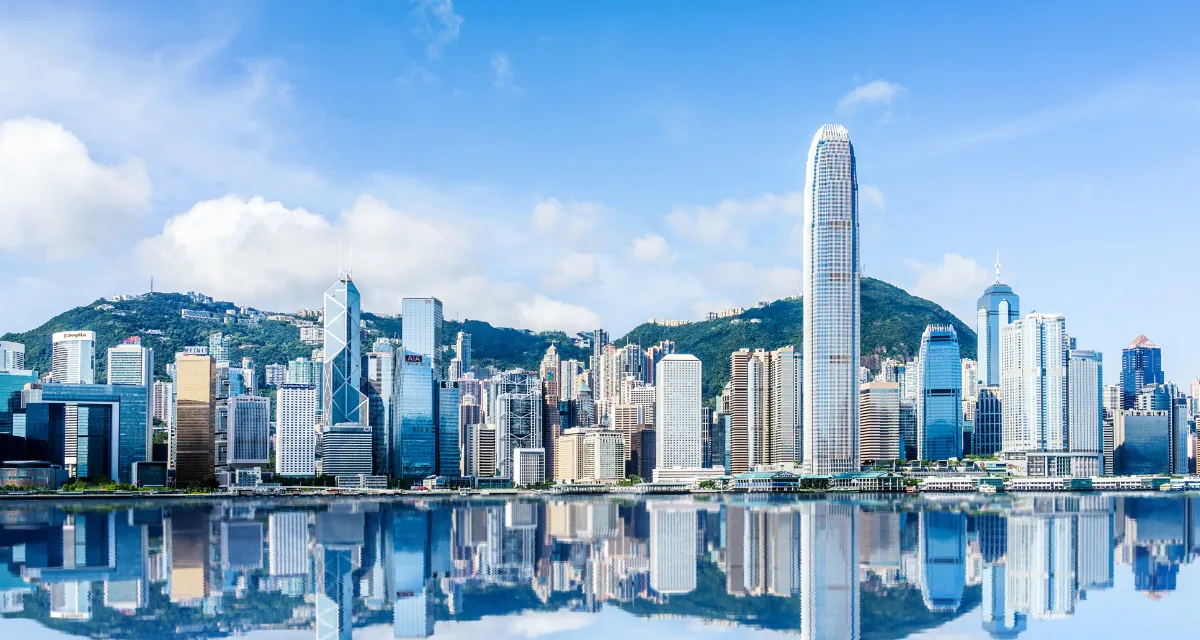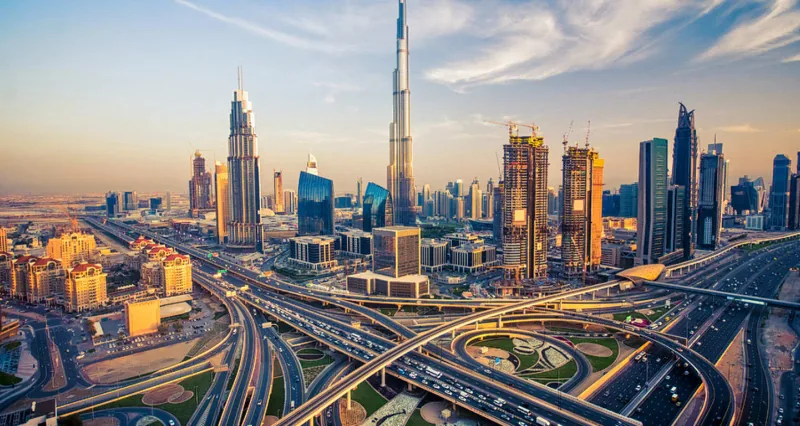Hong Kong, officially the Hong Kong Special Administrative Region of the People’s Republic of China, is a city and special administrative region of China in the eastern Pearl River Delta by the South China Sea. Hong Kong strives to become a world-class smart city, through adopting the measures set out in this Smart City Blueprint for Hong Kong. Our policy objectives to pursue smart city development are the following.
Smart City Hong Kong
Here are some real Hong Kong smart city blueprint examples of what has already been done and what are the plans for the future of Hong Kong’s smart city development:
Implemented Projects:
Smart lampposts: Hong Kong has installed over 50,000 smart lampposts that provide Wi-Fi connectivity, environmental monitoring, and real-time traffic information.
eID Smart Card: Hong Kong has introduced the eID smart card, which serves as a digital identity for citizens and enables them to access government services and e-commerce platforms.
Electronic Road Pricing: Smart City Hong Kong has implemented an electronic road pricing system that uses GPS and other technologies to charge drivers for road usage during peak hours, reducing traffic congestion and improving air quality.
Smart Waste Management: Hong Kong has implemented a smart waste management system that uses IoT sensors to optimize waste collection routes and reduce waste.
Digital Marketplace: Hong Kong has launched a digital marketplace platform that connects small and medium-sized businesses with government procurement opportunities, improving access to public sector contracts.
These initiatives are just a few examples of how Hong Kong’s Smart City Blueprint is being implemented. The government is also working on a range of other initiatives, including the development of smart homes and the implementation of smart city infrastructure such as 5G networks and Internet of Things (IoT) devices.
Future Plans Hong Kong smart city blueprint:
Smart Government: Smart City Hong Kong plans to develop a comprehensive e-government platform that integrates government services and enables citizens to access them through a single portal.
Smart Health: Hong Kong plans to introduce a smart healthcare system that includes telemedicine, e-health records, and the use of AI and big data for disease diagnosis and prevention.
Smart Tourism: Hong Kong plans to use technology to enhance the tourist experience, such as the use of augmented reality and virtual reality technology, smart tour guides, and smart ticketing systems.
Smart Energy: Hong Kong plans to develop a smart energy grid that uses renewable energy sources and smart meters to optimize energy use and reduce carbon emissions.
Smart Education: Smart City Hong Kong plans to implement a smart education system that includes e-learning platforms, digital textbooks, and the use of AI and big data for personalized learning.
Overall, Hong Kong’s Smart City Strategy aims to use technology to enhance the quality of life for its citizens, improve sustainability, and boost economic growth. The city is working towards achieving its smart city goals by collaborating with industry partners and investing in research and development.

How Smart City Hong Kong has created a culture of business ethics, corporate culture, and how encourage employees
While the focus of Smart City Hong Kong is primarily on using technology to improve the city’s infrastructure and services, there are initiatives aimed at promoting business ethics and corporate culture.
The Hong Kong Business Ethics Development Centre, mentioned previously, was established in 2008 and has since provided training to over 50,000 participants from various sectors.
One such initiative is the Code of Practice for the Electricity Supply Industry in Hong Kong, which is a voluntary code that outlines standards for the electricity supply industry in areas such as customer service, safety, and environmental protection. The code is administered by an independent committee and is regularly reviewed and updated to reflect changes in industry practices and technologies.
Another initiative is the Hong Kong Business Ethics Development Centre, which is a non-profit organization that promotes ethical business practices through training, research, and advocacy. The centre offers workshops and seminars on topics such as anti-corruption, corporate social responsibility, and ethical leadership.
In 2017, the Hong Kong Stock Exchange introduced new rules requiring listed companies to disclose their environmental, social, and governance (ESG) policies and practices.
The Independent Commission Against Corruption (ICAC) is an independent agency in Hong Kong that investigates and prosecutes corruption cases. The ICAC has been in operation since 1974 and has been recognized as one of the most effective anti-corruption agencies in the world.
Many companies in Hong Kong have adopted corporate social responsibility (CSR) practices, such as supporting charitable causes, promoting environmental sustainability, and implementing ethical business practices.
The Hong Kong Monetary Authority (HKMA), which is responsible for regulating banks and financial institutions in Hong Kong, has established a framework for promoting responsible banking practices, including principles for sustainability and climate risk management.
To encourage employees to embrace a culture of business ethics and corporate responsibility, many companies in Hong Kong have adopted policies and practices that promote transparency, accountability, and social responsibility. For example, some companies have established codes of conduct that outline ethical principles and standards of behavior, while others have implemented training programs to educate employees on ethical issues and dilemmas.
Overall, while Smart City Hong Kong’s primary focus is on using technology to improve the city’s infrastructure and services, there are efforts to promote business ethics and corporate culture through initiatives such as voluntary codes of practice, non-profit organizations, and corporate policies and practices. These efforts help to create a more ethical and responsible business environment and promote a culture of transparency, accountability, and social responsibility among employees.

Which of the following best defines Hong Kong's entrepreneurial culture?
Hong Kong’s entrepreneurial culture can be defined as dynamic and resilient, characterized by a strong work ethic, a willingness to take risks, and a focus on innovation and adaptation.
Hong Kong’s history as a global trade hub and financial center has fostered a culture of entrepreneurship, with many entrepreneurs and startups focused on international business opportunities. Hong Kong’s unique position as a gateway to the Chinese market also provides opportunities for entrepreneurs to tap into the country’s growing economy and consumer base.
The entrepreneurial culture in Hong Kong is also characterized by a willingness to embrace new technologies and business models, as well as a focus on efficiency and productivity. Startups in Hong Kong often leverage digital technologies and automation to streamline processes and reduce costs.
Overall, Hong Kong’s entrepreneurial culture is defined by a combination of factors, including its history as a trade hub and financial center, its international outlook, its focus on innovation and adaptation, and its willingness to embrace new technologies and business models.
Smart City Hong Kong, China
2.564 Smart Points

Environment
Mobility
Connectivity
Ecology
Life quality
Citizens
Government
Average
- (a) make use of innovation and technology (I&T) to address urban challenges, enhance the effectiveness of city management and improve people’s quality of living as well as Hong Kong’s sustainability, efficiency, and safety.
- (b) enhance Hong Kong’s attractiveness to global businesses and talents.
- (c) inspire continuous city innovation and sustainable economic development.
Short-, medium- and long-term recommendations in six major areas, namely: “Smart Mobility”, “Smart Living”, “Smart Environment”, “Smart People”, “Smart Government” and “Smart Economy”. Having regard to our city challenges, unique local situation, and strengths and opportunities ahead, we have mapped out in this document our smart city development plans in the next five years, and beyond.
A smart city is people-centric. It should be built upon the needs of the people and the benefits should be seen and felt by residents and visitors. We will review the effectiveness of our work from time to time, and introduce new measures to bring in more I&T applications to our city.

Vision
Embrace innovation and technology to build a world-famed Smart Hong Kong characterized by a strong economy and high quality of living
Mission
Mission 1
To make people happier, healthier, smarter and more prosperous, and the city greener, cleaner, more livable, sustainable, resilient and competitive
Mission 2
To enable the business to capitalize on Hong Kong’s renowned business-friendly environment to foster innovation, transform the city into a living lab and testbed for development
Mission 3
To provide better care for the elderly and youth and foster a stronger sense of community. To make the business, people and Government more digitally enabled and technology savvy
Mission 4
To consume fewer resources and make Hong Kong more environmentally friendly, while maintaining its vibrancy, efficiency, and livability
Current Status
Passenger trips on public transport every day with the railway being the backbone. Over 99% of Hong Kong people possess at least one Octopus card for digital payment across public transportation and retail outlets roads are dense with 354 licensed vehicles for every kilometer of road.
Intelligent Transport System and Traffic Management
- Integrate existing applications (HKeTransport, HKeRouting, and eTraffic News) into an all-in-one mobile app by 2018
- Develop the installation of “in-vehicle units” (IVUs) for allowing motorists to receive real-time traffic information and paying tunnel fees by remote means through the IVUs, without toll booths in the light of the feasibility study to be completed by 2018
- Complete the installation of about 1 200 traffic detectors in all strategic roads to provide real-time traffic information by 2020
- In light of the results of the feasibility study, engage the public to develop a detailed Electronic Road Pricing (ERP) Pilot Scheme in Central and its adjacent areas and its implementation strategy in 2019
- Introduce pilot intelligent traffic signal systems with sensors for pedestrians and vehicles at road junctions starting from 2021
- Adopt an automatic tolling system without toll booths for the new Tseung Kwan O – Lam Tin Tunnel in the light of findings of field trials and subject to the approval of the Legislative Council on the necessary legislative amendments by 2021
- Facilitate trials of autonomous vehicles in the West Kowloon Cultural District and other areas as appropriate
- Facilitate public transport operators’ plans in introducing new electronic payment systems for public transport fare collection, having regard to the systems’ reliability, user-friendliness, and efficiency
- Encourage public transport operators to open up their data
- Pilot the use of technology to deter improper use of loading and unloading bays and illegal parking from 2018
- Explore the use of crowd management system at Kai Tak Sports Park by the management authority to facilitate the monitoring of people and vehicle flows during major events
- Public Transport Interchanges (PTIs)/Bus Stops and Parking
- Release real-time information of franchised buses through mobile devices by 2018 and information display panels at government PTIs and 1 300 covered bus stops by 2020
- Install new on-street parking meters to support multiple payment systems (including remote payment through mobile applications) starting from 2019-20 with the provision of real-time parking vacancy information
- Encourage owners or operators of existing public car parks to provide real-time parking vacancy information using technology solutions to facilitate drivers to find parking spaces, and examine practicable measures to require new public car parks to provide real-time parking vacancy information
Hong Kong Smart City blueprint Environmental Friendliness in Transport
- Establish “bicycle-friendly” new towns and new development areas and improve existing cycle tracks and cycle parking facilities in new towns in phases, with the first phase of improvement works to be completed by 2018
- Take forward “Walk in HK” and encourage people to walk more by launching a series of initiatives under four themes which include
- “Make it smart” by providing user-friendly information on walking routes
- “Make it connected” by enhancing pedestrian networks
- “Make it enjoyable” by making walking a pleasant experience
- “Make it safe” by providing a safe and quality pedestrian environment
Specific measures include providing covers on certain walkways connecting to public transport facilities, commencing a study on enhancing pedestrian connectivity between Wan Chai and Sheung Wan, selecting two areas in Hong Kong for a pilot study to test out innovative measures for a comfortable walking environment, etc.
- Progressively expand walking path information on Causeway Bay and Kowloon East on government mobile apps to other districts
- Take forward the “Universal Accessibility Programme” to retrofit barrier-free access to existing public walkways, as well as those walkways which fulfill certain criteria
- Take forward new railway projects under the Railway Development Strategy 2014 in an orderly manner for the next stage of railway development, which will translate into environmental benefits by reducing roadside air pollutants and greenhouse gases
- Pilot use of green technologies in local ferry operation
Smart Airport
- Explore the provision of the seamless travel experience by using facial biometrics technology including at check-in, boarding pass checkpoint, and boarding
- Provide hassle-free travel experience for passengers by expanding mobile check-in services to off-airport locations, such as theme parks, hotels, convention centers, cruise terminal, etc., and providing baggage pick up services
- Facilitate the use of driverless vehicles in designated places, such as the restricted areas in the airport
Goals and Next Steps
- enjoy more environmentally friendly transport modes, including the use of cleaner fuel in vessels to improve air quality and address other environmental concerns
- plan their journeys more efficiently with real-time traffic information
- enjoy better traffic planning and management through enhanced use of data analytics
- enjoy easy and efficient travel with smart airport
- enjoy a pedestrian-friendly environment
Looking Ahead
- alleviate traffic congestion and tackle other traffic management and enforcement issues through wider use of technology
- facilitate the achievement of technology advancement and industry development in vehicle-to-everything (V2X) and autonomous vehicles (AV) and ultimately the introduction of AV with integrated Internet access
- enhance walkability and pedestrian wayfinding system
Smart Living
Wi-Fi Connected City
- Continue to increase the number of free hotspots under the “Wi-Fi.HK” scheme to provide free public Wi-Fi service
Digital Payment - Develop a Faster Payment System (FPS) by 2018 which supports the use of mobile phone numbers or email addresses for payments anytime and anywhere
- Facilitate a common QR code standard through the industry group established to promote the wider use of mobile retail payments and bring greater convenience to customers and merchants
eID - Provide all residents, by 2020, a free electronic identity (eID) which is a single digital identity for authentication when conducting government and commercial transactions online
- Introduce Banking Made Easy initiative by 2019 to minimize regulatory frictions in customers’ digital experience, including remote onboarding, online finance and online
Support for the Elderly and Persons with Disabilities
- Launch a $1 billion funding scheme in 2018 to support trial use and procurement of technology products by elderly and rehabilitation service units
Support for Healthcare
- Set up a Big Data Analytics Platform by the Hospital Authority for facilitating healthcare-related research in 2019, and start adopting a smart hospital approach, including the use of automatic system interface with vital sign devices or hospital navigation applications for piloting in new hospital projects by 2020
- Commission the Stage Two Electronic Health Record Sharing System in phases by 2022, which will support a broader scope of data sharing, consider the development of a Patient Portal and sharing restriction features to facilitate patients’ active management of their health, and enhance core functionalities and security/privacy protection
Goals and Next Steps
- more conveniently access free public Wi-Fi service
- enjoy convenient mobile payments anytime and anywhere
- access e-services and conduct e-transactions more conveniently and extensively with a single eID for e-government services and commercial services
- adopt more technology applications to support the elderly
- enjoy healthcare services supported by new technology applications
Looking Ahead
- promote wider use of mobile payments and bring greater convenience to customers and merchants
- promote healthy living and aging in different settings, including hospitals, care homes and ultimately in the community
Climate Action Plan 2030+
- Reduce our carbon intensity by between 65% and 70% by 2030 compared with the 2005 level
- Phase down coal-fired electricity generation gradually and replace it with natural gas and non-fossil fuel sources. Coal as a proportion of the fuel mix will be reduced from 47% as of 2016 down to about 25% in 2020
- Apply renewable energy on a wider and larger scale based on mature and commercially available technologies with the public sector taking the lead
- Further, promote energy efficiency and conservation in the community with a particular focus on buildings
- Implement other measures to achieve carbon emission reduction by phases
Green and Intelligent Buildings, and Energy Efficiency
- Promote retro-commissioning and building-based smart/IT technologies
- Install LED lamps in public lighting systems progressively under the LED Public Lighting Replacement Programme of the
- Highways Department starting from 2017-18 and encourage retrofitting LED lighting for existing government buildings
- Continue to include requirements, such as green building design, provision of smart water meter system, electric vehicle charging facility and real-time parking vacancy information for new land sale sites in Kowloon East, with a view to developing a green and smart community
Waste Management
- Reduce waste by implementing a charging scheme for municipal solid waste by end 2019 at the earliest
Pollution Monitoring - Use remote sensing devices to monitor air pollution, cleanliness of streets and public places, usage of litter and recycling bins
Goals and Next Steps
- enjoy better indoor and outdoor air quality
- live in greener buildings with various smart and energy-saving features
- use technology applications inefficient power consumption and energy conservation
- reduce daily waste at home and workplace
Looking Ahead
- adopt new green technologies when they become commercially available
- create low carbon, more sustainable environment for the people
- optimize the use of city resources, including waste reduction, reuse, and recycling
Smart People
Strategy and Initiatives Nurturing Young Talent
- Organize intensive training programs on science, technology, engineering and mathematics (STEM) education for curriculum leaders of primary and secondary schools from the 2017/18 to 2019/20 school years to enhance their capacity in holistic planning and implementation of the updated curricula and STEM-related activities
- Provide enhanced information technology (IT) training to secondary school students outside the normal school curriculum
- Enhance research and development (R&D) capability through collaboration with renowned institutions in other jurisdictions
- Encourage industry to hire STEM graduates for R&D through the “Postdoctoral Hub” program and enhanced Internship Programme
- Attract and retain more I&T professionals, especially in biotechnology, data science, artificial intelligence, robotics, and cybersecurity. Launch a fast-track I&T talent admission scheme in 2018
Innovation and Entrepreneurial Culture
- Provide financial and non-financial support to young entrepreneurs and start-ups to build a stronger I&T culture
- Expand incubation programs at Science Park and Cyberport Smart- Space
- Attract Venture Capital Fund to support entrepreneurship
- Strengthen training on innovation and application of technology for civil servants in 2018
- Establish MTR Academy and Hong Kong International Aviation Academy to train up professional expertise
Goals and Next Steps
- have more students selecting STEM as their education and professional careers
- have a local supply of data scientists and other technology practitioners in need
- have more successful entrepreneurs in their new ventures
Looking Ahead
- nurture a highly adaptive population to embrace changes in technology
- build a knowledge-based society to support future development of I&T
Hong Kong Smart City blueprint Government
Open Data
- Open up more public and private sector data in digital forms to facilitate research and innovation via the government one-stop Public Sector Information Portal (data.gov.hk), starting with the health, transport and education sectors from 2018
- Promote using open data for smart city innovations

Smart City Infrastructure
- Fifth-generation (5G) mobile networks are the catalyst for smart city development, offering ultra-high speed and high capacity, supporting device-to-device ultra-reliable/low latency communications and enabling massive machine-to-machine communications for better implementation of Internet of Things (IoT). Hong Kong is all geared up for the commercial launch of 5G services and applications in 2020
- Adopt eID common login by 2020 and enhance e-services user experience with the help of artificial intelligence, chatbot and big data analytics
- Implement the multi-functional smart lampposts pilot scheme starting from 2019 to facilitate collection of real-time city data to enhance city management and other public services
- Build a new big data analytics platform by 2020 which will enable real-time data transmission and sharing among government departments
- Adopt public cloud services with enhanced security features for government departments to deliver efficient and agile e-services by 2019
- Revamp the government cloud infrastructure platform by 2020 to enable digital government services delivery through collaboration and partnership among government departments, IT service providers and other third party entities
- Enhance the Government’s cybersecurity capability to address new security risks, facilitate collaboration among stakeholders to promote awareness and incident response capability in the community
Adoption of Technology
- Support the adoption of technology by government departments to improve public services through dedicated funding
- Adopt Building Information Modelling (BIM) for major government capital works projects starting from 2018 and develop Common Spatial Data Infrastructure (CSDI) by 2023 to facilitate sharing of geospatial data across government departments and government-to-business (G2B) applications, including the launch of CSDI portal, 3D digital map, electronic submission hub for building plans
- Explore the development of smart city facilities, such as smart lampposts, smart rubbish, and recyclables collection bins where appropriate
Goals and Next Steps
- enjoy a much broader scope of user-friendly and more responsive public services delivered digitally
- build more innovative applications and services using open data
- enjoy higher efficiency and innovation based on BIM and CSDI
Looking Ahead
- encourage open data in public and private sectors
- improve public services through the adoption of technology under a data-driven approach
- review legislation and regulations to support innovation
Smart Economy – Fintech Dubai
- Promote Fintech initiatives and explore distributed ledger technology applications in different areas, including trade financing and cross-boundary transactions
- Facilitate the introduction of virtual banking as another model of service delivery
- Formulate by 2018 a framework to facilitate the development and wider adoption of API by the banking sector, thereby stimulating innovations and improving financial services through collaboration between banks and technology firms
Smart Tourism
Provide tourist facilitation services through smart technologies by 2018 at the Hong Kong International Airport, the West Kowloon Station of the Guangzhou- Shenzhen-Hong Kong Express Rail Link and the Hong Kong Boundary Crossing Facilities of Hong Kong-Zhuhai- Macao Bridge
- Enrich tourists’ experiences in Hong Kong through the adoption of smart features using ICT and virtual images by 2018
- Enhance tourist experience through the smart airport, Wi-Fi Connected City initiative, and smart lampposts
- Encourage the tourism trade to leverage innovative technology to assist in managing visitor flow, providing more personalized tourist services, marketing, and promotion, etc. for enhancing its competitiveness
Promoting Sharing Economy
Review existing legislation and regulations so as to remove outdated provisions that impede I&T development. Develop new economic pillars.
- Promote R&D and re-industrialization
- Plan for the setting up of key technology collaborative platforms and bring in internationally-renowned universities, research institutes, and I&T companies
- Provide enhanced tax deduction for qualifying expenditure incurred by enterprises on R&D in 2018-19 to incentivize companies to increase investment in technological R&D
- Review the Government’s procurement arrangements by 2018 to include I&T as well as design thinking as tender requirements to encourage local technological innovation
- Build Data Technology Hub and Advanced Manufacturing Centre by 2020 and 2022 respectively in Tseung Kwan O
- Collaborate with Shenzhen to develop an Innovation and Technology Park at Lok Ma Chau Loop for I&T enterprises, universities, and research institutions from Hong Kong, overseas, and the Mainland. Strive to make available the first developable land in 2021-22 or earlier
Goals and Next Steps
- position itself as a viable and attractive location to fully develop innovative business ideas
- become a preferred location for consideration of technology investment
- be perceived as an innovative and technologically advanced tourist destination
Looking Ahead
- enhance the overall business climate, particularly in areas of the technology-driven economy like Fintech and re-industrialization
- further, develop our I&T ecosystem to attract more start-ups and investors from other jurisdictions
- attract more leading talents and investments to enhance our city’s economic vibrancy













